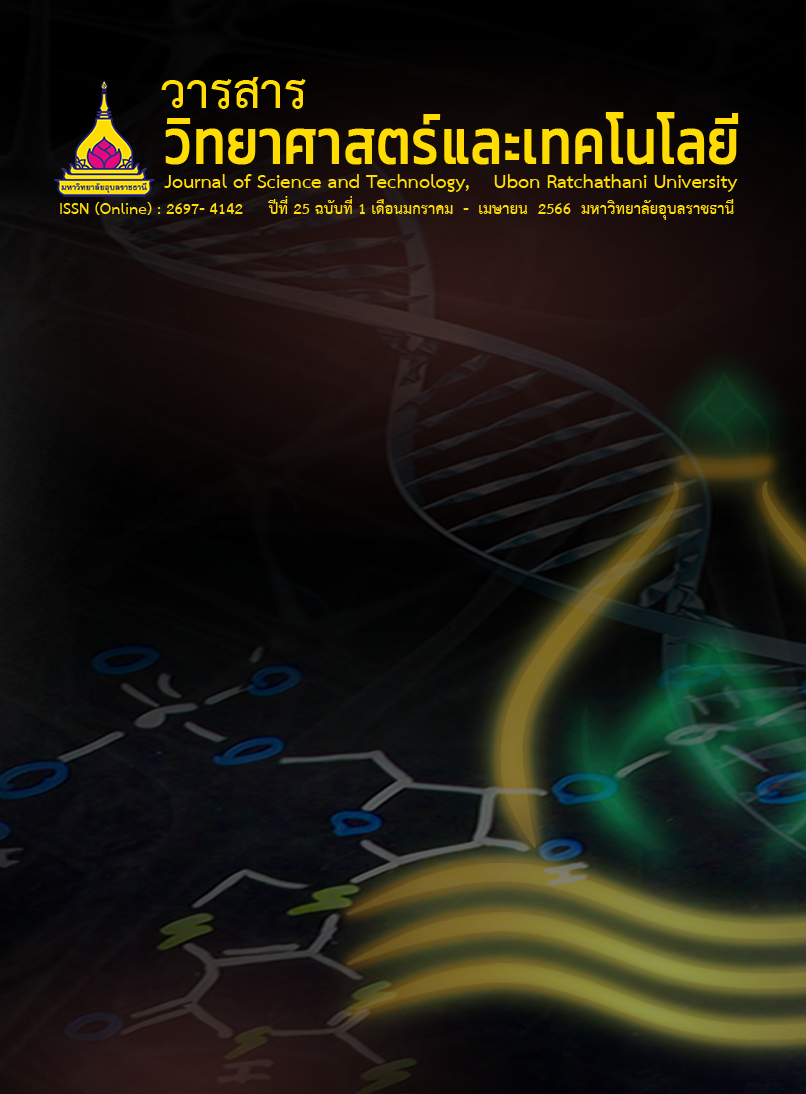ผลเฉลยของสมการไดโอแฟนไทน์ p^x+pq^y=z^2 เมื่อ p และ q เป็นจำนวนเฉพาะที่แตกต่างกัน
Main Article Content
บทคัดย่อ
บทความนี้แสดงผลเฉลยทั้งหมดที่เป็นจำนวนเต็มที่ไม่เป็นลบของสมการไดโอแฟนไทน์ เมื่อ
และ
เป็นจำนวนเฉพาะที่แตกต่างกัน นอกจากนี้สมการดังกล่าวจะไม่มีผลเฉลยที่เป็นจำนวนเต็มที่ไม่เป็นลบ ถ้า
และ
สมภาคกับ 1 มอดุโล 4
Article Details

อนุญาตภายใต้เงื่อนไข Creative Commons Attribution-NonCommercial-NoDerivatives 4.0 International License.
บทความที่ได้รับการตีพิมพ์เป็นลิขสิทธิ์ของ วารสารวิทยาศาสตร์และเทคโนโลยี มหาวิทยาลัยอุบลราชธานี
ข้อความที่ปรากฏในบทความแต่ละเรื่องในวารสารวิชาการเล่มนี้เป็นความคิดเห็นส่วนตัวของผู้เขียนแต่ละท่านไม่เกี่ยวข้องกับมหาวิทยาลัยอุบลราชธานี และคณาจารย์ท่านอื่นๆในมหาวิทยาลัยฯ แต่อย่างใด ความรับผิดชอบองค์ประกอบทั้งหมดของบทความแต่ละเรื่องเป็นของผู้เขียนแต่ละท่าน หากมีความผิดพลาดใดๆ ผู้เขียนแต่ละท่านจะรับผิดชอบบทความของตนเองแต่ผู้เดียว
เอกสารอ้างอิง
Sroysang, B. 2012. On the Diophantine equation 3^x+5^y=z^2. International Journal of Pure and Applied Mathematics. 81(4): 605-608.
Sroysang, B. 2014. On the Diophantine equation 7^x+31^y=z^2. International Journal of Pure and Applied Mathematics. 92(1): 109-112.
Bacani, J.B. and Rabago, J.F.T. 2015. The complete set of solutions of the Diophantine equation p^x+q^y=z^2 for twin primes p and q. International Journal of Pure and Applied Mathematics. 104(4): 517-521.
Cheenchan, I. and et al. 2016. On the Diophantine equation p^x+5^y=z^2. Sakon Nakhon Rajabhat University Journal of Science and Technology. 8(1): 146-148.
Burshtein, N. 2017. On solutions of the Diophantine equation p^x+q^y=z^2. Annals of Pure and Applied Mathematics. 13(1): 143-149.
Burshtein, N. 2019. All the solutions of the Diophantine equations p^x+p^y=z^2 and p^x-p^y=z^2 when p≥2 is prime. Annals of Pure and Applied Mathematics. 19(2): 111-119.
Laipaporn, K., Wananiyakul, S. and Khachorncharoenkul, P. 2019. On the Diophantine equation 3^x+p5^y=z^2. Walailak Journal of Science and Technology. 16(9): 647-653.


